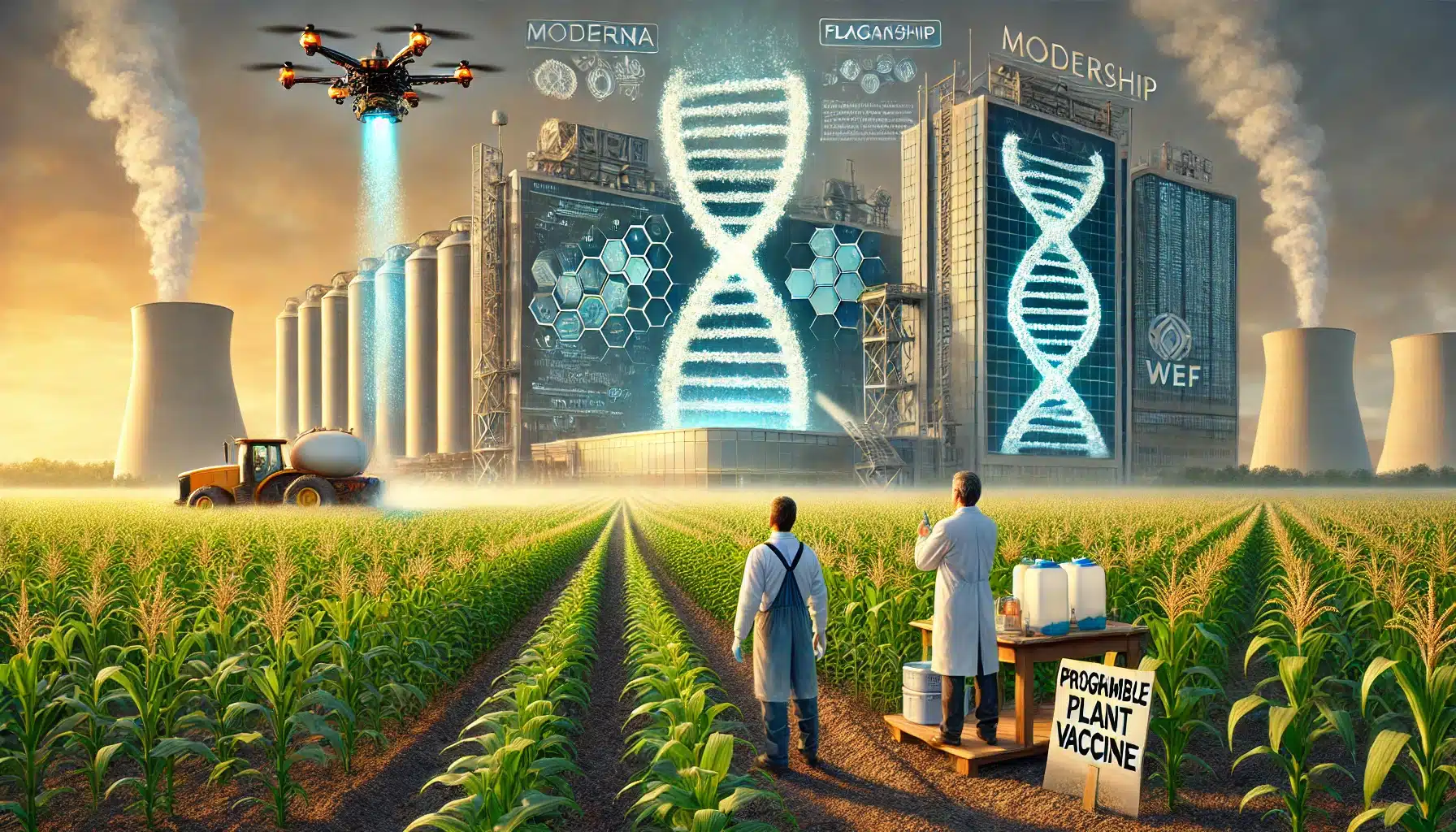ADVERTISEMENT
If You Liked The Covid Shot … You’ll Love This
What began in the world of pharmaceuticals is now heading for your dinner plate. The same network of biotech powerbrokers who developed mRNA vaccines—Moderna and its parent company, Flagship Pioneering—have launched a new venture to rewrite the genetic code of the global food supply.
ADVERTISEMENT
Their latest creation, Terrana Biosciences, has secured $50 million in funding to develop an RNA spray that penetrates plants, alters their gene expression, and passes those changes down to future generations.
This isn’t theory or conspiracy. It’s outlined in Tarana’s own mission statement and proudly broadcast through industry press releases. Their goal is to apply the same RNA manipulation they pioneered in human medicine to the agricultural system. It’s a program of genomic transformation—executed not through soil and seed but via spray canisters and tank mixes.
Terrana’s Mission: Programmed Plants and Heritable Change
What makes Terrana different from traditional genetically modified crops is the method of delivery. Instead of altering DNA in a lab, their RNA technology is sprayed directly onto leaves. The RNA enters through microtears in the plant’s surface, where it begins programming the plant from the inside out. These changes are not temporary—they’re heritable, carried forward into the seeds and the next generation of plants.
Terrana calls these applications “programmable plant vaccines.” Their promotional language stresses that they are simply working with the plant’s “native language”—as if the reprogramming of natural life systems by biotech algorithms is a gentle form of conversation, not a radical intervention.
This rhetorical trick—equating engineered RNA with the plant’s natural biology—is eerily similar to how the pharmaceutical industry pitched mRNA injections to the public during the pandemic: safe, natural, and effective.
The Usual Suspects: Big Ag Meets Big Pharma

Terrana’s leadership reads like a who’s who of genetic engineering. Their team includes veterans from Monsanto, Bayer Crop Sciences, Roche, Thermo Fisher, and other AgTech and pharma giants. These are not farmers seeking to breed more resilient crops; they are data scientists and genetic engineers with decades of experience manipulating DNA, RNA, and protein pathways for corporate purposes.
And they aren’t alone. Monsanto (now Bayer) is pushing its own RNA-based tech under the brand “BioDirect,” claiming it too is based on “natural” molecules. But there’s nothing natural about global RNA spraying campaigns from planes, or about applying AI-driven synthetic molecules to entire ecosystems.
Sprayed From the Sky, Designed in the Lab
Teranna admits its products are being developed for tank mixes—solutions that can be applied en masse via crop dusters or drone fleets. This isn’t backyard gardening. It’s agriculture at industrial scale, and it’s meant to be airborne. That raises serious questions about genetic drift, unintended contamination of neighboring fields, and the potential transformation of non-target plants, including those in organic systems.
This isn’t hypothetical. We’ve already seen lawsuits over GMO crops drifting onto organic farms and corrupting their genetics. Terrana’s RNA sprays could do the same, only faster, more pervasively, and with lasting generational effects.
ADVERTISEMENT
Justifying the Genetic Rewrite: Climate Panic as a Cover Story
Predictably, the rationale for this sweeping overhaul of global agriculture is climate change. The story goes like this: winters in the Pacific Northwest are getting warmer, fruit trees aren’t blooming properly, and rather than replant all the orchards, we’ll just spray RNA on the leaves to trick the plants into behaving as if winter had occurred. The technology becomes the savior narrative—restoring productivity, buffering against climate extremes, and buying time until we find “permanent solutions.”
But this logic mirrors the same mindset behind geoengineering—dim the sun, spray aerosols into the atmosphere, and genetically engineer every living system on earth to comply with climate goals. It’s not stewardship of the planet; it’s an industrial reboot of creation.
From the Garden to the Grid: A Biblical Scale Transformation
Terrana’s work isn’t just a new tool in the agricultural toolkit. It represents a worldview shift—a move toward controlling the genetic blueprint of everything that grows. Combined with past efforts to alter the human genome, this suggests a kind of digital dominion over biology, where AI, Big Pharma, and global financiers decide what traits survive into the next generation.
In biblical terms, this is the kind of hubris that marked the days of Noah—a time when creation itself was being corrupted. RNA sprays that reformat the genetic language of crops may seem like science fiction, but they are happening now, in public, funded by familiar faces, and cheered by corporate media.
What Will Be Left Untouched?
Every technology can be justified if the narrative is strong enough. Terrana and its backers are banking on climate urgency, biotech optimism, and public confusion to move forward unchecked. But when the same people who engineered experimental gene therapies for humans turn around and offer the same methods for your food, it’s worth asking some hard questions.
ADVERTISEMENT
What happens when unregulated, unchecked genetic alteration becomes a matter of everyday life? Who regulates the heritability of traits passed on in our crops? What rights do farmers have when their fields are involuntarily exposed? And perhaps most critically: if we permanently alter the genomes of the plants that feed the world, what are we ultimately consuming?
The era of RNA agriculture has arrived—not with a warning, but with a press release and a $50 million seed round. Whether this future is one of abundance or irreversible genetic chaos remains to be seen.
ADVERTISEMENT
